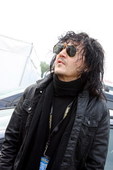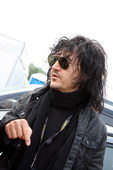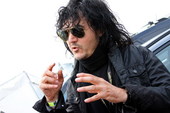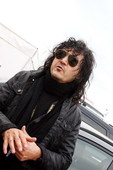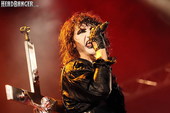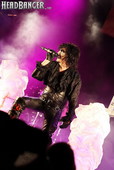Death SS
All The Colors Of The Dark
05.07.2014
Архив интервью | Русская версияEven though Europe these days does not have internal borders, each European country has its own hard rock and metal legends, which are not necessarily well known outside this country. If we speak about Italy, such hard rock and metal legend would be Death SS. The band led by vocalist and primary songwriter Steve Sylvester (hence “SS” in its title – we’re disambiguating it right here before anyone starts making wild guesses) has been around since 1977, and its musical evolution may serve as an illustration of the genre’s development as a whole. Unfortunately, the band’s history has never been linear, and stellar albums were quite often followed by periods of downtime, which, together with quite restricted live activity outside Italy, might be the reason why in many of the countries Death SS has not gained the recognition it deserves. Therefore, the band’s presence in the line-up of Sweden’s major hard rock festival Sweden Rock in June 2014 seemed a lucky chance for us not only to see Death SS live, but also to interview Steve Sylvester and give the Russian public some insights of the band. Unfortunately, the interview eventually turned out extremely rushed – the festival’s press area was being prepared for the press conference of the mighty Black Sabbath, and the security people were not too keen on having extra people backstage. Nevertheless, we did get a chance to ask Steve the questions which were on top of our priority list.
As far as I know, a Death SS show outside Italy is a rare occasion. How did Sweden Rock Festival convince you to perform here tonight?
Usually Death SS prefer to play few gigs, but in good places, very well organized, just to offer the people a real show. When the guys from Sweden Rock offered us the opportunity, we accepted it, because it was the first time that Death SS plays Sweden, and it is one of the best festivals of the world. We’re also open to come to Russia.
Your latest release “Resurrection” (2013) comes after a long break in the activity of the band. What happened to Death SS after the release of “The 7th Seal” (2006), and what were you doing during this “silent period” of the band’s story?
Things went very slowly and calm because after “The 7th Seal” and tour I decided to work in another area. I made some soundtracks for horror movies, I played a few roles myself in cinema and on TV, and I made two different musical projects – Sancta Sanctorum and Opus Dei. Then after I collected some very good songs, I decided to come back with Death SS. “Resurrection” is a strange album, each song on it was composed and recorded separately, one by one, and only then it was assembled and mixed together. There is a kind of concept behind the album, the first half of the album is like a soundtrack to the movies we’ve made, and the other half kind of continues the Aleister Crowley concept of “Do What Thou Wilt” that we made many years ago, in 1996. It’s a mix of everything we have done until now with something new. In particular, we integrated the old comics feeling, I’m a collector of old sexy horror comics, such as Sukia, Zora, or Jacula, those were famous in Italy in the 70s. All of this mixed together resulted in “Resurrection”.
What are the musicians that are playing with you in Death SS at the moment?
When I did the tour in support of “The 7th Seal”, the line up was quite the same as it is now, less the drummer. The people that are playing with me now have been in the band for 7-8 years. Just the drummer (Bozo Wolf) is a new guy, he’s been with me for two years.
If you take a look at bands like Lordi, it’s pretty obvious that they looked up to Death SS for inspiration when it comes to costumes as well as to the music. And do you get inspired by younger bands? For instance, I was reading a CD review of “Resurrection” on the Internet, and the reviewer wrote, “’Resurrection’ almost feels like the Deathstars album I’ve been waiting for…” Do you have any comments on this?
Many metalheads have told me that Death SS in the last years has too many electronics, is kind of too modern. What I can comment on it is just that it’s a kind of evolution of our original sound. The sound, the style and the concept are just the same, but album after album I try to evolve it, and this concerns the music I have to express, and the lyrics I have to write and sing, to make it a bit more similar to the hard rock of today. I don’t like to repeat myself, I don’t like to continue doing the things that I’ve done many times and that are very old-fashioned. I like the 70s, I listen to a lot of dark sounds from the 70s such as Black Sabbath, Black Widow, everything you want, but I also enjoy what is the modern taste of the same thing. Deathstars are a good band, but it is completely different from Death SS. We are not too much like Rob Zombie, we are more like Alice Cooper, for example. And we have an Italian taste, which is only Italian and unique to Death SS. We are not an American Halloween band. We like to play for fun, and to transmit the sensation of fun to the audience. But this is no something which you can limit to just one style. We are doom, we are dark, we have some elements of prog metal, some elements of modern metal, and some electronics, but we’re not industrial.
Death SS is probably the earliest Italian metal band that I am aware of. How was it like to be a fan of hard rock and heavy metal in Italy those days?
It was very hard. We weren’t the first, there were some good progressive rock bands in Italy in the 70s…
Do you mean bands like Banco Del Mutuo Soccorso, Area, etc?
Yes, and also bands like PFM, Osanna, Le Orme, they were very known all over Europe in the 70s, but they had no relation to metal or something harder. When we started, we were just children, we tried to do everything we liked. We listened to Sweet, Slade, Black Sabbath, and we also listened to very early punk rock, and we tried to so something new in Italy, and it is still new now.
I’ve read in the press that over the years you have had some problems in Italy over the content of your music and shows. Is the situation getting better or worse? Is the Italian public more ready for Death SS now, or is it getting more conservative?
The things for us have not changed much. We are Number One band in Italy, the most well-known band in Italy, but the problems now are not so different from what we had 20 years ago. (laughs)
But you are still going forward, aren’t you?
Why not?! Until I have the strength to do it…
Do you plan to continue making new albums with Death SS, or will there be another long break in the band’s discography after “Resurrection”?
I don’t know. I will decide at the last moment.
What is necessary to bring Death SS over to Moscow or St. Petersburg? What kind of requirements do you have to local promoters?
The main problem is that it’s very expensive. If all our expenses are covered, we would also need a big stage where we can put all our choreography and do a very good show.
Death SS on the Internet: http://www.deathss.com
Special thanks to Alex (Nihil Productions) for arranging this interview
Interview by Roman Patrashov
Photos by Natalie “Snakeheart” Patrashova
June 6, 2014
© HeadBanger.ru
